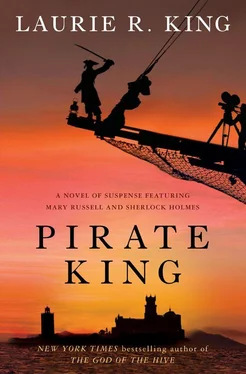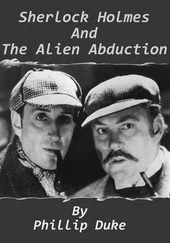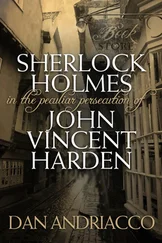I gave a brief laugh. “Will-the-Camera may murder him.”
“I’d hold the camera while he did so.” A veil of rain moved towards us across the water, the dock, and then our hats. Hale sighed. “I need a drink.”
Fflytte shook his head, scattering rain in a wide circle, when Hale told him it was time to go, and insisted on accompanying Pessoa on his search for the Harlequin ’s owners. Only when Hale pointed out that having a wealthy foreigner along, openly mooning over the ship, would drive the hire price through the roof did the director allow himself to be pulled away.
At the dock’s end, Pessoa pulled together his lapels and walked off towards what I assumed were the harbour offices. Fflytte watched him go, then turned and give a last soulful look at the once-proud ship. From this angle, one could see that even her name was not original, that beneath the fading letters some previous incarnation strove to peep through.
Even slapping on a rough coat of paint was going to cost Fflytte Films a fortune.
* * *
We returned to the Avenida-Palace just before three o’clock, and although Hale pulled Fflytte towards the bar, I was very glad to see that tea was being served. I peeled away my damp overcoat and wrapped my hands around my cup, welcoming the obscuring steam on my spectacles.
I could write Holmes another letter, bringing him up to date on the entrance of a sailing vessel into our lives, but I had to admit, the investigation I’d been sent to carry out had been rather pushed onto a back burner. And Fflytte and Hale would be in and out of their rooms for the rest of the day, making trespass hazardous. Perhaps there was some stray member of the crew, abandoned here in the hotel, ready to spill the beans about Fflytte Films.
As if my thoughts had been a wish and my personal genie was sitting bored at my side, a familiar figure appeared at the door, a wizened, bow-legged man in rumpled tweeds and a soft cap. Will retained the looks of the Welsh farm-labourer he had been when he first wandered onto the Fflytte estate some forty years before, a sixteen-year-old orphan seeking work that didn’t involve a mine-shaft. Now, he was clearly looking for someone, but I stuck my hand in the air and waved in a gesture too energetic for him to ignore. With reluctance, he came in.
“Will-the-Camera,” I said. “We were just talking about you.”
Will was not one of your garrulous Welshmen. He merely glanced his question at the empty chairs.
“I’ve been out with Mr Fflytte and Mr Hale. Here, sit down. Like some tea? Waiter, another cup,” I called, ignoring the cameraman’s protestations that no, he really- “We just got back from a sight-seeing trip around the town with Mr Pessoa, and you’ll never guess what we found?”
“A rhinoceros?”
I paused, taken aback by this unexpected note of levity from a man who looked not in the least like he was making a joke. “Er, no. A ship. A very old and beat-up brigantine that Mr Fflytte decided is just the thing for a couple of scenes.”
Will dropped his head into his hand with a mutter that sounded like, “Jaizus.”
“I imagine you’ve been involved with any number of, well, challenging situations. Haven’t you worked with Fflytte Films for a long time?”
“Since before it was Fflytte Films,” he agreed. He scowled down at the cup I’d poured for him, doubtless wishing it might turn into something translucent and more fortified.
“Really? What was it then?”
“It was young Master Fflytte with a camera. Which he didn’t know how to work so he hunted me down on the estate and shoved it at me, told me to learn how to run it.”
“Well, you certainly did that. You’ve filmed almost all of his movies, haven’t you?”
“A fair number.”
“What a lot of stories your camera could tell! Were you there when the equipment went overboard?”
“I went overboard after it,” he replied.
“Good … heavens. The wave took you, too?”
“Nah, I jumped. Thought I might be able to save it, but it went down too fast. Left me with nothing but a tape-measure. Granted, my favourite tape-measure.”
Again, I couldn’t tell if this was laconic humour or mere fact. His expression gave no hint. He reminded me of a friend of my father’s, an older man who’d spent years around cowboy camp-fires in the West, mastering the art of the tall tale in a way my childhood self could only dimly appreciate, or even recognise.
“Well, that’s good, then,” I prattled cheerfully. “Have a biscuit? What about that short Mr Fflytte made during the War, filmed from an observation balloon? Was that you?”
“It was. Two years later we filmed in the trenches. Under fire. That one was never released.”
“Oh, for a peaceful life,” I commented. “But even after the War it doesn’t sound peaceable – wasn’t there one film where a polar bear went berserk?”
“Started as Anna Karenina . Shifted to The North . That got scrapped, too. I couldn’t look at the rug they made out of him for years. After that, I told Mr Fflytte I did not care to work with dangerous animals.”
“So when they made Moonstone , someone else worked the camera?”
“For the cobras, you mean? No, Moonstone was before the polar bear. But when I saw the script for Hannibal , in ’twenty-two, I said no thanks.”
“And yet here you are, working with thirteen girls.” He shot me a glance, decided I was joking, thought about that for a moment, and then sat back in his chair with a chuckle.
“You’re right. I must be mad.”
The point of my questions had not been the perils of making a Fflytte film, but to find out if the man had held a camera for Fflytte during the War years. The Aeronaut was made in 1915, and I knew that his proposed film The Front took place two and a half years later.
“It sounds as if you’ve handled Mr Fflytte’s cameras pretty much his entire career.”
“There’ve been two or three he had other operators for – I broke my hand just before Krakatoa . And there was a year when my wife was dying. Other than those, yes, it’s all Will Currie.”
I expressed condolences about his wife, and asked a question about the cameras, and film, and what problems he might anticipate, shooting on board the Harlequin . My curiosity about the technical side of his profession disarmed him, loosing his tongue a shade. I went on in that vein, sliding in the occasional investigatory question about the crew and cast, but taking care to keep the emphasis light, even when I asked about my predecessor, Lonnie Johns.
“What about her?” he asked.
“What was she like?”
“She’s what Daniel Marks might call a ‘good kid.’ Nice. Hard working. Not terribly quick in the wits. Why do you ask?”
“I just wondered why she’d left. Wondered maybe if she didn’t get along with someone.”
“Like who?”
“I don’t know. Mrs Hatley, perhaps?”
Will snorted. I raised my eyebrows. When he did not explain his wordless comment, I probed a little. “Well, Mrs Hatley seems a bit on the formidable side. And she doesn’t appear always to get along with Mr Hale and Mr Fflytte.”
But that took things just a bit too far. He smiled, and said, “Yes, they’ve known each other a fair time now,” and reached for the watch on his chain.
I slipped in a last question. “I’m a little surprised Mr Fflytte hasn’t made a War movie, other than the balloon one. I mean The Great War – I know about the Boer film.”
He popped open his watch, giving an expression of mild alarm that suggested he’d forgotten he was looking for someone when I waylaid him. “Hale won’t have it,” he said, getting to his feet. “Made it clear when he was de-mobbed that any movie about the Front would be made without him. And Fflytte won’t work without Hale, so that’s it. Thanks for the tea, Miss Russell. And for the warning about the boat.”
Читать дальше












